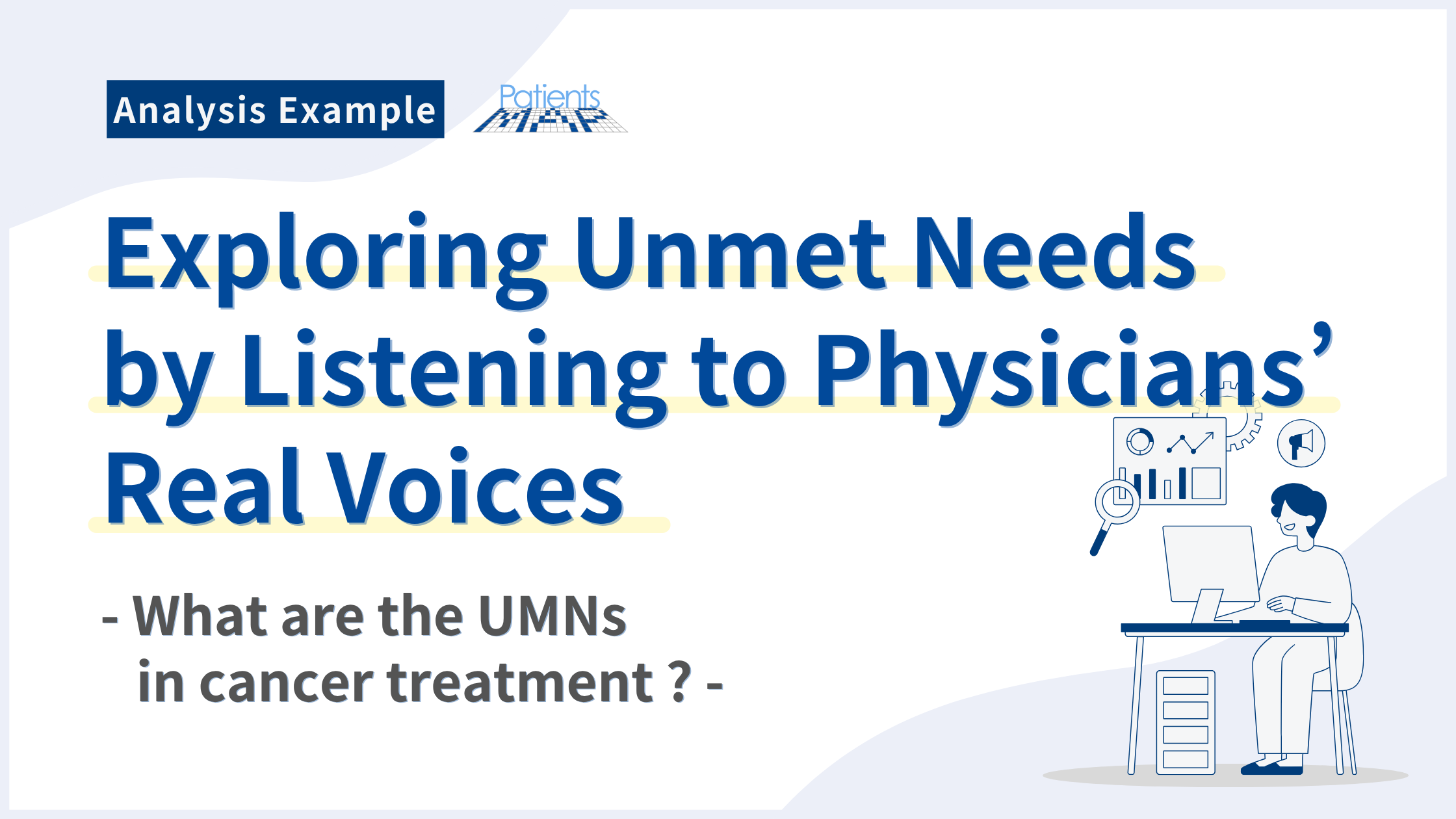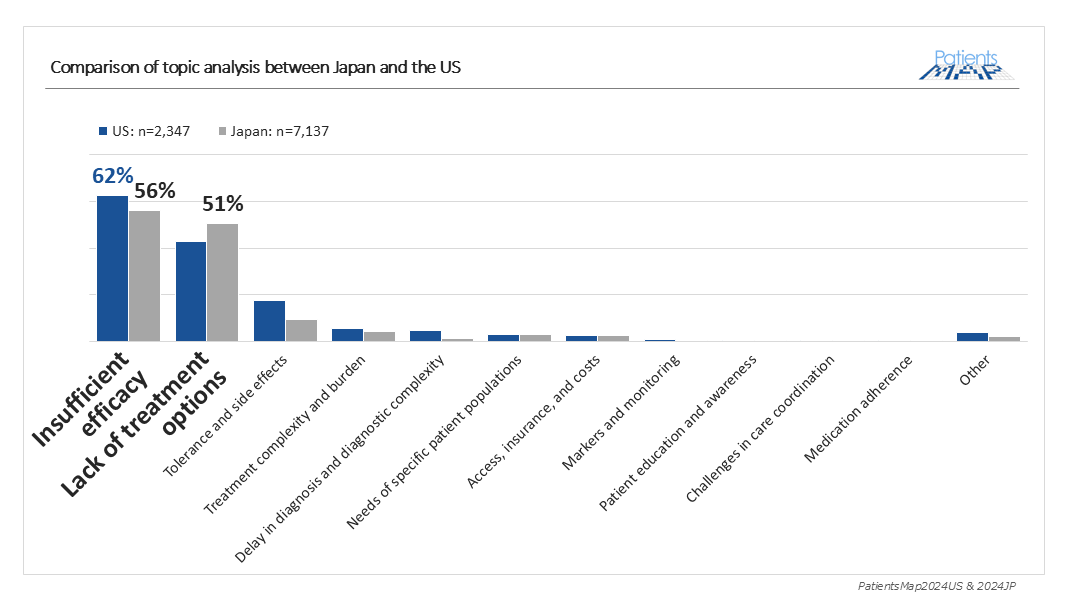Exploring Unmet Needs by Listening to Physicians’ Real Voices
- What are the UMNs in cancer treatment? -

An accurate understanding of unmet needs, which is the most important challenge faced in the development of a new drug.
In this case study, we introduce new cases of analyses in search of development tips in the field of oncology based on the real voices (open-ended response text) of Japanese and American physicians using AI.
Contents
Introduction
Unmet needs are an important indicator in new drug development. However, it is difficult to capture the complex realities of clinical practice and the subtleties of each physician's awareness of the challenges they face using quantitative surveys with multiple choice alone. Truly valuable insights lie hidden in the open-ended responses that physicians write in their own words.This case study shows how AI is used to analyze a vast array of physicians’ real voices to discover development tips that have gone unnoticed until now. Using the field of oncology as an example, we will introduce the specific process and the insights that have been gained.
Analysis overview
- Purpose of analysis:
- To determine the direction of new drug development in the field of oncology, the unmet needs of physicians in Japan and the US will be extracted and compared and their structure will be explored.
- Analysis data:
- Open-ended response text data on reasons for desiring new drugs and dissatisfaction and challenges with the existing treatments in the field of oncology and malignant tumors surveyed using PatientsMap (US: n=2,347; Japan: n=7,137)
- Analysis method:
- Topic analysis and text summarization using AI (natural language processing)
Analysis result 1:[Macro analysis]
Gap in the awareness of challenges between Japanese and American physicians upon looking at topic analysis
Topic analysis using AI breaks down what, at first glance, may seem like a miscellaneous collection of voices saying "we want new drugs" into multiple specific challenges and requests (topics) so a comprehensive picture of needs can be visualized structurally. This makes it possible to obtain an objective understanding of the major trends in the entire market.For this case study, we will use this analysis to compare the differences in the awareness of challenges between physicians in Japan and the US.
The following are the results of a comparison between Japan and the US according to the 12 topics obtained from the topic analysis.

By looking at this graph, the important points that highlight the characteristics of the Japanese and US markets can be seen.
- Japan: The challenge is to ensure both 'Sufficient efficacy' and 'Treatment options.'
- It was revealed that the two biggest challenges facing Japanese physicians are improving efficacy and expanding treatment options. This suggests that there is a strong demand for improvements in both quality and quantity of treatment.
- US: The biggest theme is the pursuit of 'Quality that surpasses the existing treatments.
- It was determined that US physicians are focused on one thing and that is insufficient efficacy. This suggests that it may be important to demonstrate benefits that surpass the existing standard treatments.
Analysis result 2:[Micro analysis]
Deeper meaning of physicians' real voices searched with AI summarization
In the topic analysis above, it was revealed that US physicians in particular perceive 'insufficient efficacy' to be their biggest challenge.Now, what exactly do they mean when they say "insufficient efficacy" and what improvements do they want?
To find the answer to these questions, summary analysis using AI is performed to delve deeper into each open-ended response.
The following is a summary of the insights that AI gained from the voices of US physicians.
- " Barriers' to the existing treatments and a desire for a breakthrough "
- Challenges for chemotherapy and immunotherapy: Many physicians have pointed out the limitations of chemotherapy for metastatic and treatment-resistant cancers, and the issues with immunotherapy, which is only effective for some patients. In particular, there is a strong demand for more effective and sustainable treatments for hormone-resistant prostate cancer, high-risk bladder cancer, and various Stage 4 diseases.
- "Expectations for personalized medicine are 'Reliable medicine'*.”
- Desire for gene-targeted therapy: It has been found that there are very high expectations for personalized medicine based on the genetic characteristics of patients for many cancers, such as brain tumors, melanoma, breast cancer, and hepatocellular carcinoma. A highly reliable therapeutic approach that does not simply treat cancer but prevents recurrence and progression at the genetic level* is recognized as the key to the next generation of treatment.
- "Another important axis called "Improvement of QOL.'"
- Improvement of side effects and convenience: Current treatments may be effective, but they often have strong side effects that adversely affect patients' QOL. Pain management and expectations for oral medications that do not require a port are extremely important not only from the perspective of improving medication adherence, but also from the perspective of helping patients regain their everyday lives.
Summary
In this case study, physicians' open-ended response data were analyzed using two AI approaches, namely topic analysis (understanding the overall picture on a macro level) and AI summarization (delving deeper into specific needs on a micro level). As a result, structural differences in the awareness of challenges by country as well as specific development directions such as personalized medicine and improved QOL based on objective data could be clarified.PatientsMap's AI analysis objectively and multidirectionally analyzes the vast and diverse real voices of physicians to uncover true unmet needs that have not been fully understood until now. This enables data-based decision-making and contributes to dramatically increasing the probability of success of new drug development.
Please feel free to contact us for more detailed analyses or case studies in other disease fields.
We can also provide more detailed analyses and proposals tailored to your challenges.
